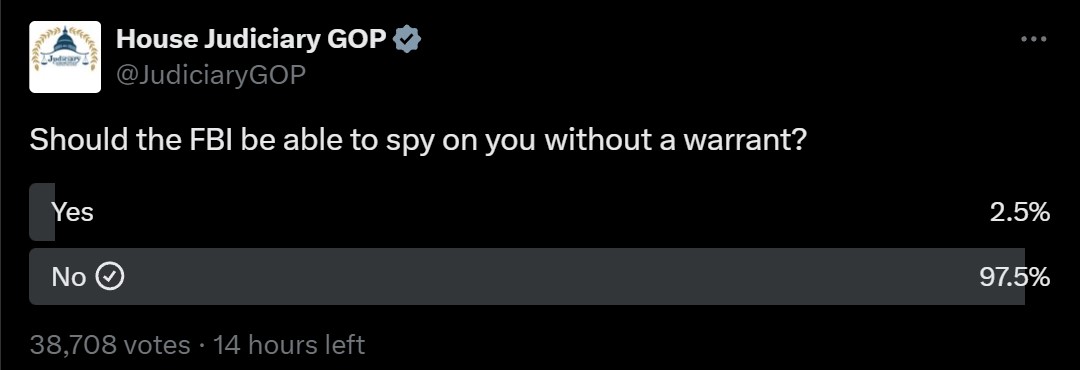The House of Representatives is currently debating a controversial warrantless surveillance measure that is set to expire in a matter of days.
The stickiest amendment would mandate a warrant requirement for the FBI to search for information on U.S. persons gathered in the NSA’s 702 database — something the Biden administration has strenuously pushed back against — and the end of certain loopholes that allow data brokers to sell consumer information to law enforcement and federal agencies.
The deadline for renewing the legislation is April 19. The entire House is likely to vote on the bill on Thursday.
Congressman Thomas Massie, a Republican from Kentucky, revealed a carveout for Congress in the legislation.
“Congress gives itself a carve out in the reauthorization of FISA 702 warrantless spying on Americans,” Massie said. “The bill requires the FBI to notify and seek consent from Congress before violating the privacy of Congressmen.”
“This will persuade many members of Congress to vote yes,” he added.
Ask yourself:
If there’s nothing wrong or unconstitutional in this program, why does Congress want a carve out for itself?
Shortly, I’ll post video of my questioning of the Intel Chairman about this topic in the Rules Committee this evening.
— Thomas Massie (@RepThomasMassie) April 10, 2024
“Ask yourself: If there’s nothing wrong or unconstitutional in this program, why does Congress want a carve out for itself?” he asked. “Shortly, I’ll post video of my questioning of the Intel Chairman about this topic in the Rules Committee this evening.”
Congressman Matt Gaetz (R-FL) indicated that he will be against a FISA surveillance renewal without substantive reforms.
“I will vote AGAINST the rule to proceed on the FISA bill this week unless we at least have the opportunity to get votes on the things that will fix the problems with it!” Gaetz said. “If
Speaker Johnson is unwilling to fix FISA, we are left wondering what he is indeed willing to fix.”
I will vote AGAINST the rule to proceed on the FISA bill this week unless we at least have the opportunity to get votes on the things that will fix the problems with it!
If @SpeakerJohnson is unwilling to fix FISA, we are left wondering what he is indeed willing to fix. pic.twitter.com/syiR4nNKcr
— Rep. Matt Gaetz (@RepMattGaetz) April 9, 2024
Fellow Florida Congressman Cory Mills (R) also stated that he is opposed to the FISA legislation unamended.
“I will not support any reauthorization and further misuse of spying on Americans, as proven in the over 287,000+ violations of FISA by the FBI,” Mills said. “No more warrantless queries. GET A WARRANT.”
I will not support any reauthorization and further misuse of spying on Americans, as proven in the over 287,000+ violations of FISA by the FBI. No more warrantless queries.
GET A WARRANT #FISA
— Cory Mills (@CoryMillsFL) April 9, 2024
Senator Mike Lee (R-UT) also weighed in on the impending FISA reform fight.
The House must NOT reauthorize FISA 702 without a warrant requirement.
Please share and tell your representative immediately, as votes are scheduled for tomorrow.
— Mike Lee (@BasedMikeLee) April 9, 2024
The Brennan Center for Justice has published a one-pager explaining how the legislation would do nothing to stop the more than 27,000 cases of FISA warrantless surveillance abuse from continuing without abandon.
BCJ One-pager on RISAA 4-9-24 by The Brennan Center for Justice
The key parts of the Brennan Center’s informatic one-page sheet:
• Although the bill has a five-year sunset for Title VII of FISA (which includes Section 702), it also has a provision stating that Section 702 will revert back to its pre-RISAA form on the sunset date. The FISA Court is likely to read this sloppy drafting as fully sunsetting all the other provisions of Title VII (including provisions that contain vital protections for Americans), but sunsetting only the RISAA“reforms” for Section 702. That means Section 702 would become permanent—without any reforms.
• The bill’s leading “reform” is a prohibition on backdoor searches performed for the sole purpose of finding evidence of a crime—i.e., with no foreign intelligence purpose. As the bill’s drafters know, however, the FBI almost never labels its searches “evidence-of-a-crime only.” In 2022, a year in which the FBI conducted 204,090 backdoor searches, this prohibition would have stopped the FBI from accessing Section 702 data in only two cases. This prohibition would not have prevented any of the egregious abuses cited above, all of which were purportedly intended to find foreign intelligence.
• The bill’s other “reforms” relating to backdoor searches are equally toothless. For instance, several provisions just codify changes that the FBI has already made to its training, supervisory approval, and systems access requirements. But those changes have proven to be insufficient. After the FBI implemented them, the government continued to report FBI violations at a rate of 4,000 violations per year, including searches for the communications of a U.S. Senator, a state senator, and a state court judge who contacted the FBI to report civil rights violations by a local police chief.
• The bill gives special treatment to members of Congress, requiring notification and consent for certain queries of lawmakers that are not required for queries of ordinary Americans.
The House Rules committee on Tuesday considered the Reforming Intelligence and Securing America Act, the bill to reauthorize FISA Section 702.
🚨Happening now: The House Rules committee considers the Reforming Intelligence and Securing America Act, a bill to reauthorize FISA Section 702.
I'll share thoughts on the hearing below, and you can watch it here:https://t.co/Xu0eF8tPqZ
— Noah Chauvin (@NoahChauvin) April 9, 2024
Judiciary Chairman Jim Jordan (R-OH) noted that “in a one-year period the FBI violated the rules governing searches of FISA databases 278,000 times, and notes that RISAA, on its own, would do nothing to prevent the worst abuses,” Noah Chauvin reported.
House Judiciary Ranking Member Jerrold Nadler (D-NY) also said “he cannot support the reauthorization of Section 702 without serious reforms,” as reported by Chauvin. “Plugs the House Judiciary Committee bill, notes that it passed the fractious committee 35-2.”
However, national security hawk Rep. Mike Turner (R-OH) argued that “Congress is coming down to the wire for reauthorizing Section 702 because of the need to carefully rein in the intel agencies.”
Chauvin then points out a “blatant lie” from Mike Turner, who “claims there’s no warrantless searches of Americans’ data under FISA. That’s a blatant mischaracterization.”
“Americans can’t be *targets* of warrantless surveillance,” he remarked. “But our communications are ‘inevitably’ captured by this surveillance.”
“Unbelievable how blatant a lie this is from Rep. Turner,” he added.
Chauvin then took the Ohio Congressman to task for another misrepresentation of what is in the bill.
Rep. Turner, he remarked, “either doesn’t know what’s in his own bill, or he’s lying about it. Claims the bill doesn’t have special protections for members of Congress. There’s no question about it: it does.”
Kentucky congressman Thomas Massie posted an online survey on X on the issue of whether the U.S. government should be able to spy on citizens without a warrant.


Over 97% said “no.”
NOW READ:
Arizona Attorney General Says She Won’t Enforce State Supreme Court Ruling Banning Abortion






